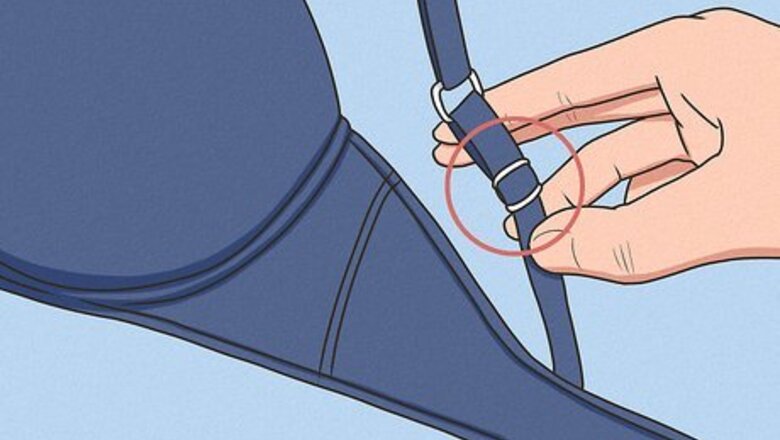
views
Adjusting Bra Straps for Length
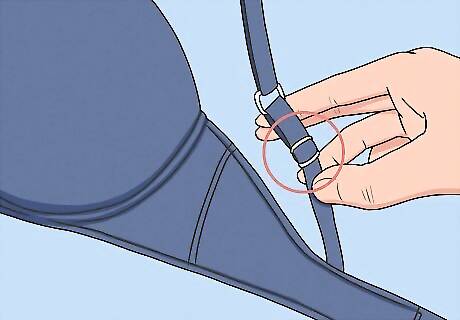
Locate the slide adjuster on your straps. It is a little metal or plastic clip that you can slide up and down the length of your strap. Some slide adjusters can run the full length of the strap, while others can only run about halfway. On a new bra, you will probably find the strap adjustor all the way at the back of the bra strap, near the bra band (the part that hooks across your back). Some bras, like most sports bras, are made from a single piece of fabric, and therefore do not have adjustable straps. If your straps are too loose or too tight on a bra like this, then there is an issue with the overall fit and you need a new bra. It is usually easier to adjust the strap if you are not wearing the bra. The adjustor will normally lie against your back, which makes it hard to reach unless you remove your bra.
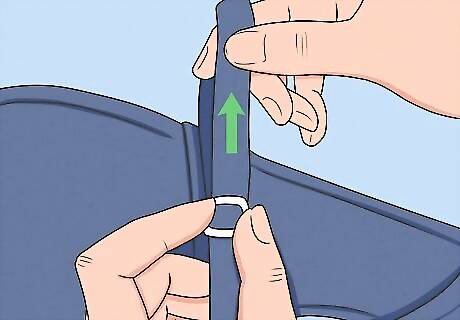
Tighten a loose bra strap by holding the slide adjuster with the fingers of one hand and pulling front of the strap toward the cup with your other hand. As the strap slides through the adjuster, the adjuster will move closer to the bra band. The closer the adjuster is to the band, the shorter and tighter the strap becomes. If you are trying on a new bra and you have to adjust the straps to the tightest position, it's not the bra for you. Your straps will stretch over time, so you need to have some room to tighten them later. Try a bra with a smaller band size.
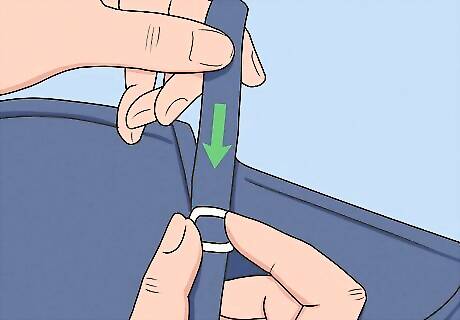
Loosen a tight bra strap by holding the slide adjuster in one hand and pulling the back part of the strap away from the adjuster. The slide adjuster should move closer to the bra cup. The closer the adjuster is to the cup, the shorter and tighter the bra strap will become.
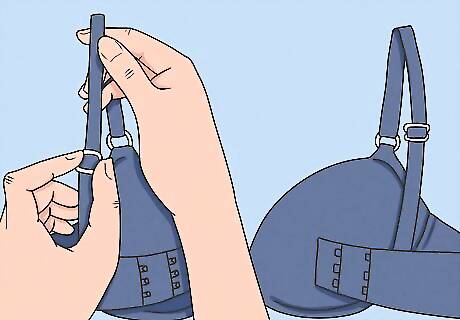
Adjust the other strap. Remember that you probably won't want it the exact same length as the first strap, though. Your breasts are not identical in size or shape, so one strap may be a little tighter or looser than the other. This is completely normal and nothing to be self-conscious about.
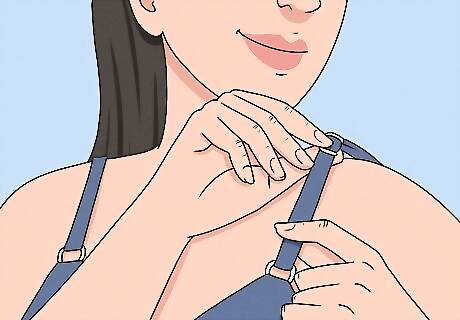
Try on your bra and adjust as necessary. If your straps are fitted properly, they will lie flat and smooth against your chest and they will hold the cups against your breasts. Always re-adjust your bra after you wash it, as the process may cause the slide adjusters to move. If the straps are as tight or as loose as they can be and you are still having issues (the strap is falling off your shoulder, the straps are cutting into your skin), read the following sections to learn possible causes and how you can solve them.
Identifying Why Straps Are Too Loose
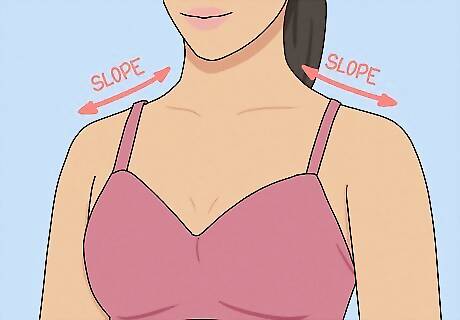
Look at the slope of your shoulders. Some women are born with narrow or sloping shoulders and some develop them later in life. This can make it difficult to keep your bra strap from falling off your shoulder, even if your bra is the correct size. If this is the case, you may need to try a different style bra. Look for bras with straps that are closer to the middle of the back, such a leotard backs, racerback, or straps that criss-cross over your back. Avoid bras with "camisole backs," which come straight down and attach to the bra band at a right angle. Try a halter bra, which loops around your neck and attaches just at the front of your bra. Make sure the front of your bra straps attach to the cup right above the apex of your breast, or your nipple. A bra with convertible straps will allow you to try different styles (racerback, criss-cross, halter) so you can adjust for a comfortable fit or for different outfits. You can buy a clip that attaches to the straps of your bra, pulling them together into a racerback style and keeps them in place on your shoulders.
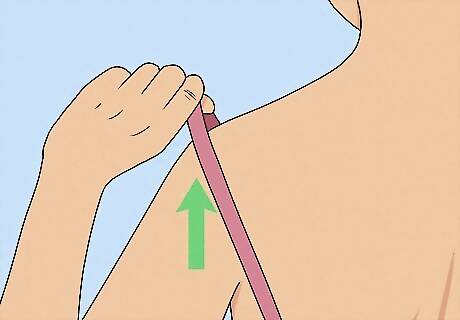
Test the elasticity of your straps. Over time, your bra straps will lose elasticity and become looser and looser, causing you to tighten them. If they lose too much of their elasticity, you may not be able to make them tight enough to stay on your shoulders. Slide your finger under your strap and pull up. If it easily stretches to your ear, it's too loose and needs to be replaced. If you take good care of your bra (don't wear the same one every single day, hand wash and air-dry them, and put them on properly), they should last about 6-9 months, if not longer.
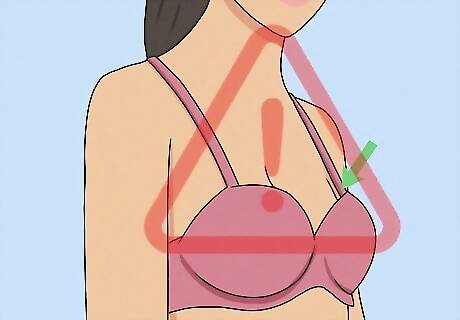
Make sure your bra isn't too big. The band should be snug against your back and parallel to the ground. Your breasts should fill the cups without pinching (giving you the appearance of having four boobs), and the cups should lay flat against your breasts. If your bra doesn't fit the above criteria, try a smaller band or cup size. You can measure yourself at home or be professionally fitted for a bra that fits properly.
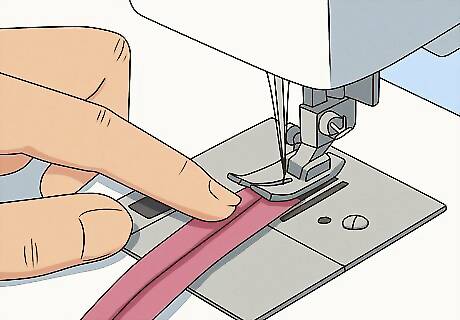
Get your bra straps shortened. Petite women may find their straps are always too long, no matter how much they tighten them. A tailor or lingerie shop may do this for you, or you can do it at home by removing an inch or two from the strap and re-sewing it.
Identifying Why Straps Are Too Tight
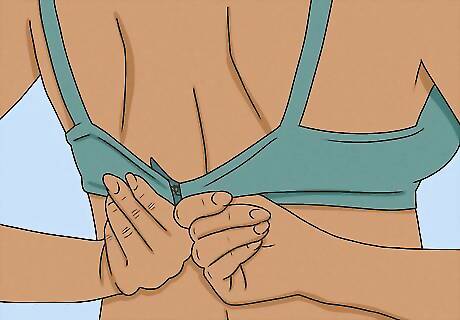
Check that the bra band is the right size. Your bra straps should be doing minimal work to hold up your breasts--a properly fit bra band should provide almost total support. If the band is too loose, you may be tightening your straps to pick up the slack, causing them to gouge into your shoulders. Your bra band should be snug, but no so tight that you can't slide a finger between the fabric and your skin at the front of your bra. The band should be parallel to the floor and sit no higher than the bottom of your shoulder blades. If you measure your bust and find your bra band is the right size but still too loose, then it's simply too old and needs to be replaced.
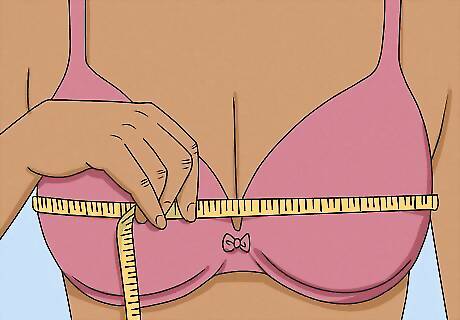
Make sure your cup size is correct. If your cup size is too large, you may be tightening your straps too much to keep the cups from looking pointy or to pull the them flat against your chest. If your cup size is too small, the straps may not be long enough to accommodate your breasts and be pulled tight, gouging your shoulders. A bra in the correct size will have cups that lie smooth and flat against your chest, without pinching or causing your breasts to overflow from the sides or top. If the center panel of the bra (the part between the cups) doesn't lie flat against your breastbone, your cups may be too small, forcing you to tighten your straps to a painful degree.
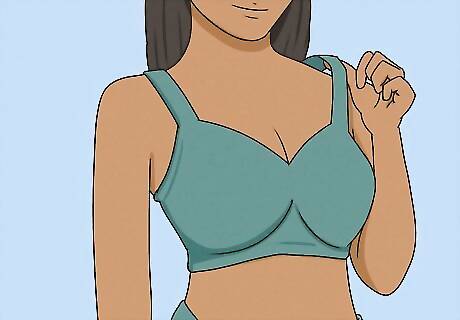
Wear a bra with wider straps. Many full-support bras come with wider straps, which distribute weight better than thin straps and provide more comfort. Even with a properly fitted bra, thin straps can sometimes still be painful for women with larger breasts. Try to avoid them when possible.
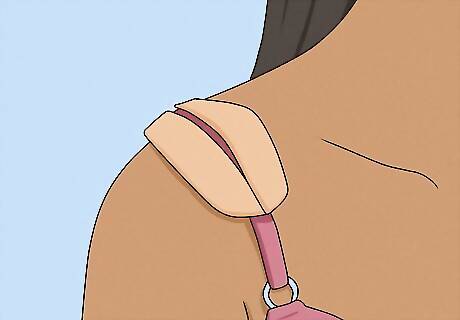
Buy a cushion to wear under your straps. If your bra fits properly but the straps are still causing you discomfort, invest in cushioning designed specifically for bra straps. They fit under or around your straps and should mold against your skin so they are not obvious under your clothes. Some bra straps, especially wider straps, come with build-in cushioning for added comfort.


















Comments
0 comment